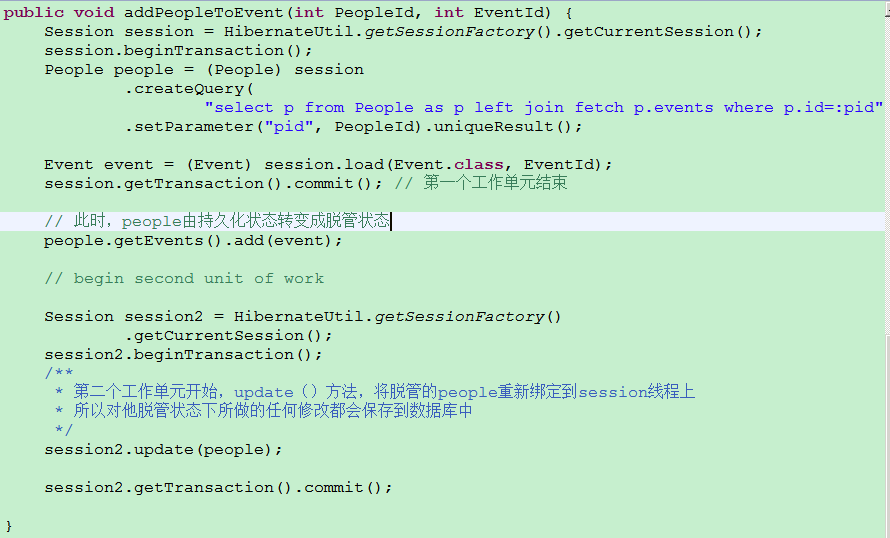Hibernate获得session方法getCurrentSession()和openSession()
1 getCurrentSession创建的session会和绑定到当前线程,而openSession不会。
2 getCurrentSession创建的线程会在事务回滚或事物提交后自动关闭,而openSession必须手动关闭
这里getCurrentSession本地事务(本地事务:jdbc)时 要在配置文件里进行如下设置
? ? * 如果使用的是本地事务(jdbc事务)
?<property name="hibernate.current_session_context_class">thread</property>
?* 如果使用的是全局事务(jta事务)
?<property name="hibernate.current_session_context_class">jta</property>?
getCurrentSession()使用当前的session
openSession()重新建立一个新的session
在一个应用程序中,如果DAO 层使用Spring 的hibernate 模板,通过Spring 来控制session 的生命周期,则首选getCurrentSession ()。
使用Hibernate的大多数应用程序需要某种形式的“上下文相关的” session,特定的session在整个特定的上下文范围内始终有效。然而,对不同类型的应用程序而言,要为什么是组成这种“上下文”下一个定义通常是困难的;不同的上下文对“当前”这个概念定义了不同的范围。在3.0版本之前,使用Hibernate的程序要么采用自行编写的基于 ThreadLocal的上下文session,要么采用HibernateUtil这样的辅助类,要么采用第三方框架(比如Spring或Pico),它们提供了基于代理(proxy)或者基于拦截器(interception)的上下文相关session。
从3.0.1版本开始,Hibernate增加了SessionFactory.getCurrentSession()方法。一开始,它假定了采用JTA事务,JTA事务定义了当前session的范围和上下文(scope and context)。Hibernate开发团队坚信,因为有好几个独立的JTA TransactionManager实现稳定可用,不论是否被部署到一个J2EE容器中,大多数(假若不是所有的)应用程序都应该采用JTA事务管理。基于这一点,采用JTA的上下文相关session可以满足你一切需要。
更好的是,从3.1开始,SessionFactory.getCurrentSession()的后台实现是可拔插的。因此,我们引入了新的扩展接口 (org.hibernate.context.CurrentSessionContext)和新的配置参数 (hibernate.current_session_context_class),以便对什么是“当前session”的范围和上下文(scope and context)的定义进行拔插。
请参阅 org.hibernate.context.CurrentSessionContext接口的Javadoc,那里有关于它的契约的详细讨论。它定义了单一的方法,currentSession(),特定的实现用它来负责跟踪当前的上下文session。Hibernate内置了此接口的两种实现。
org.hibernate.context.JTASessionContext - 当前session根据JTA来跟踪和界定。这和以前的仅支持JTA的方法是完全一样的。详情请参阅Javadoc。
org.hibernate.context.ThreadLocalSessionContext - 当前session通过当前执行的线程来跟踪和界定。详情也请参阅Javadoc。
这两种实现都提供了“每数据库事务对应一个session”的编程模型,也称作每次请求一个session。Hibernate session的起始和终结由数据库事务的生存来控制。假若你采用自行编写代码来管理事务(比如,在纯粹的J2SE,或者 JTA/UserTransaction/BMT),建议你使用Hibernate Transaction API来把底层事务实现从你的代码中隐藏掉。如果你在支持CMT的EJB容器中执行,事务边界是声明式定义的,你不需要在代码中进行任何事务或 session管理操作。请参阅第 11 章 事务和并发一节来阅读更多的内容和示例代码。
hibernate.current_session_context_class 配置参数定义了应该采用哪个org.hibernate.context.CurrentSessionContext实现。注意,为了向下兼容,如果未配置此参数,但是存在org.hibernate.transaction.TransactionManagerLookup的配置,Hibernate会采用org.hibernate.context.JTASessionContext。一般而言,此参数的值指明了要使用的实现类的全名,但那两个内置的实现可以使用简写,即"jta"和"thread"。
1、getCurrentSession()与openSession()的区别?
* 采用getCurrentSession()创建的session会绑定到当前线程中,而采用openSession()
创建的session则不会
* 采用getCurrentSession()创建的session在commit或rollback时会自动关闭,而采用openSession()
创建的session必须手动关闭
2、使用getCurrentSession()需要在hibernate.cfg.xml文件中加入如下配置:
* 如果使用的是本地事务(jdbc事务)
<property name="hibernate.current_session_context_class">thread</property>
* 如果使用的是全局事务(jta事务)
<property name="hibernate.current_session_context_class">jta</property>
利于ThreadLocal模式管理Session
? ?早在Java1.2推出之时,Java平台中就引入了一个新的支持:java.lang.ThreadLocal,给我们在编写多线程程序
? ?时提供了一种新的选择。ThreadLocal是什么呢?其实ThreadLocal并非是一个线程的本地实现版本,它并不是一个Thread,
? ?而是thread local variable(线程局部变量)。也许把它命名为ThreadLocalVar更加合适。线程局部变量(ThreadLocal)
? ?其实的功用非常简单,就是为每一个使用某变量的线程都提供一个该变量值的副本,是每一个线程都可以独立地改变自己的副本,
? ?而不会和其它线程的副本冲突。从线程的角度看,就好像每一个线程都完全拥有一个该变量。
? ?ThreadLocal是如何做到为每一个线程维护变量的副本的呢?其实实现的思路很简单,在ThreadLocal类中有一个Map,
? ?用于存储每一个线程的变量的副本。比如下面的示例实现(为了简单,没有考虑集合的泛型):
public class HibernateUtil {
public static final ThreadLocal session =new ThreadLocal();
public static final SessionFactory sessionFactory;
? ?static {
? ? ? try {
? ? ? ? sessionFactory = new Configuration().configure().buildSessionFactory();
? ? ? } catch (Throwable ex) {
? ? ? ? ? ?throw new ExceptionInInitializerError(ex);
? ? ? } ? ?
}
? ? ?public static Session currentSession () throws HibernateException {
? ? ? ? Session s = session.get ();
? ? ? ? if(s == null) {
? ? ? ? ? s = sessionFactory.openSession ();
? ? ? ? ? session.set(s);
? ? ? ? ? ?}
? ? ? ? ?return s;
? ? ? ?}
? ? public static void closeSession() throws HibernateException {
? ? ? ? ? ?Session s = session.get ();
? ? ? ? if(s != null) {
? ? ? ? ? ? s.close();
? ? ? ? }
? ? ? ? session.set(null);
? ? }
}
openSession() 与 getCurrentSession() 有何不同和关联呢?
?
在 SessionFactory 启动的时候, Hibernate 会根据配置创建相应的 CurrentSessionContext ,在 getCurrentSession() 被调用的时候,实际被执行的方法是 CurrentSessionContext.currentSession() 。在 currentSession() 执行时,如果当前 Session 为空, currentSession 会调用 SessionFactory 的 openSession 。所以 getCurrentSession() 对于 Java EE 来说是更好的获取 Session 的方法。

